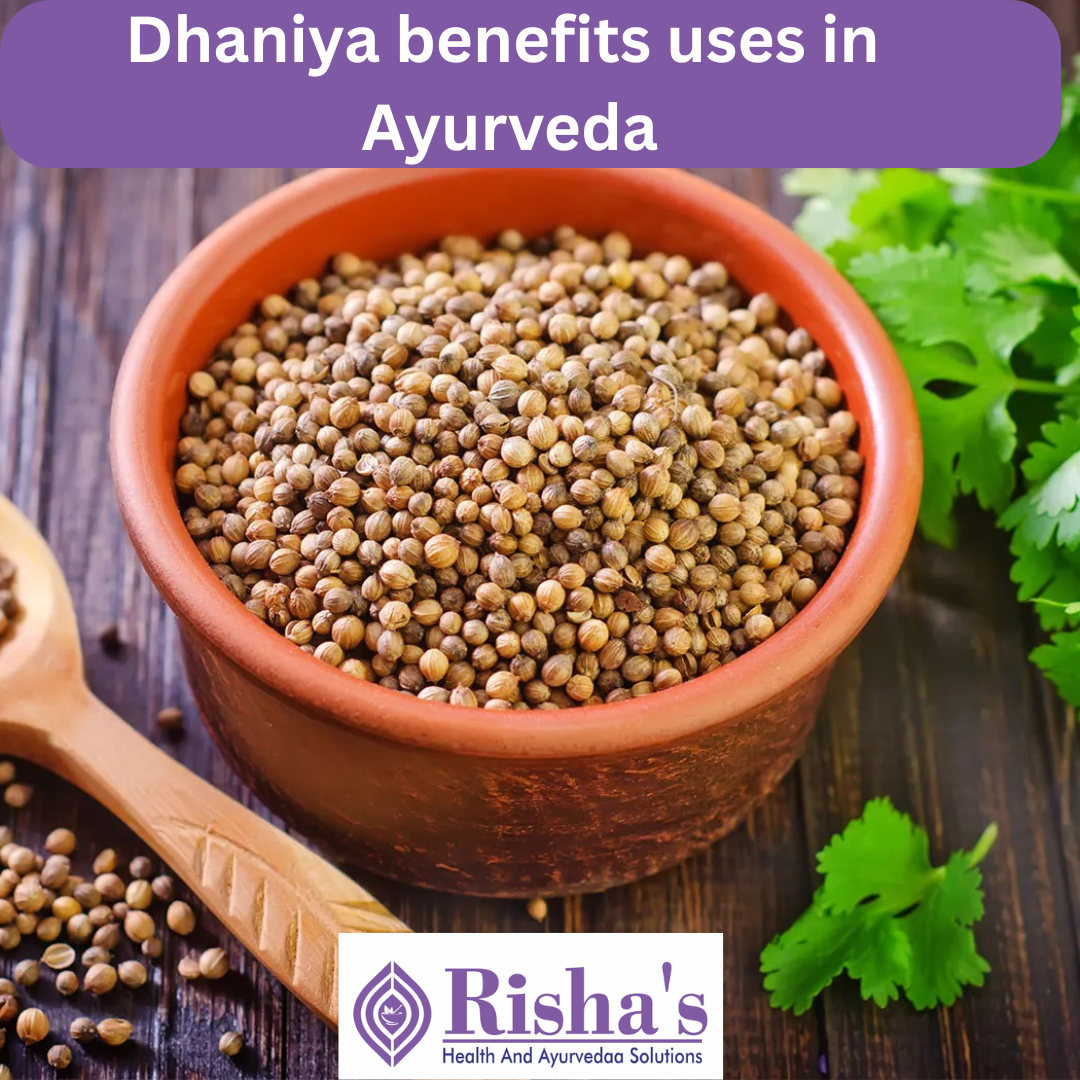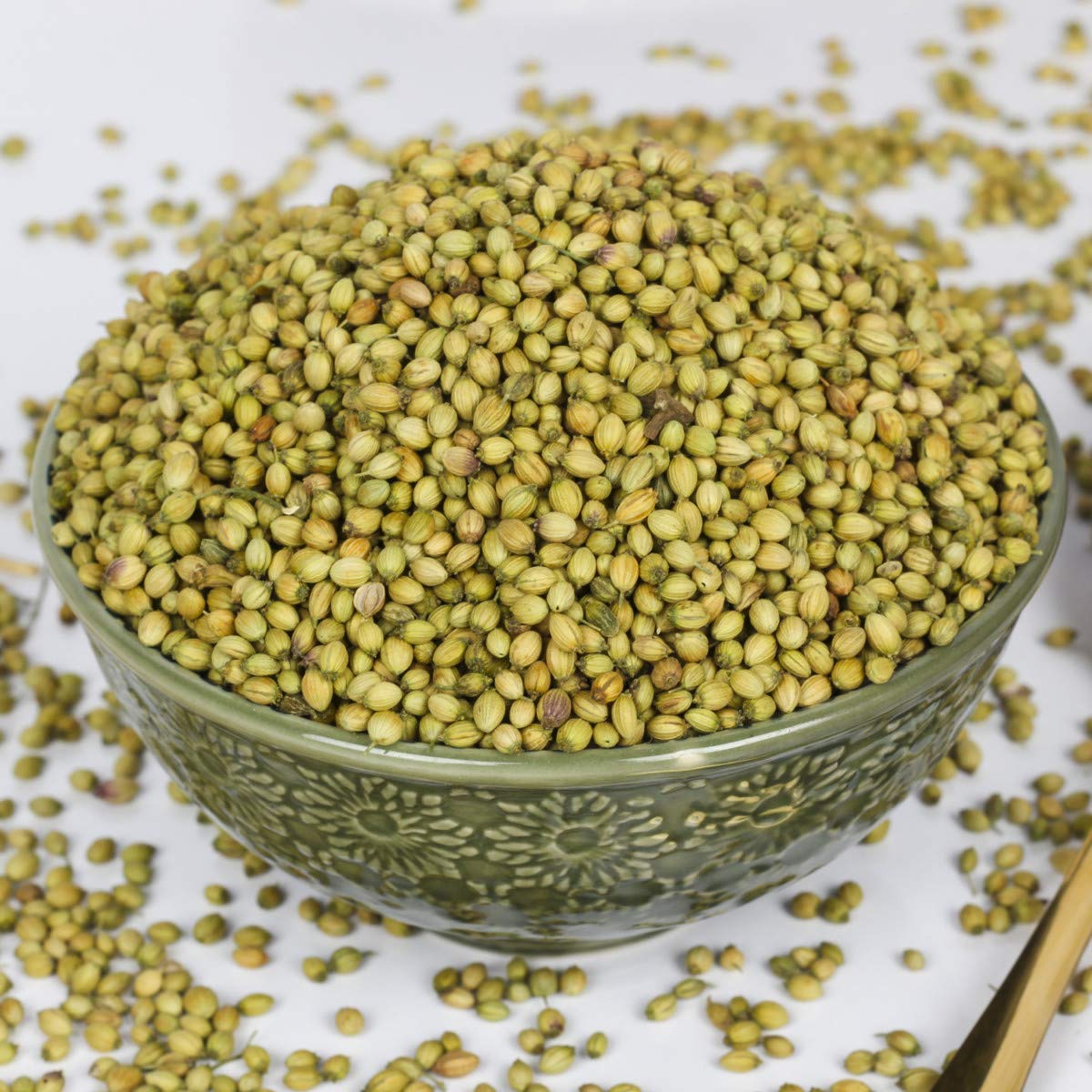Dhaniya benefits uses and home remedies

What are the benefits of dhaniya?
Dhaniya (Coriander) as we lovingly call it in India — is more than just a garnish on your dal or a flavor booster in chutneys. This humble herb has been a staple in Indian kitchens and Ayurvedic medicine for centuries. While we often use its leaves to brighten up a dish or its seeds to temper our curries, coriander has a deeper, richer history in wellness traditions.
In Ayurveda, dhaniya benefits our health because of its ability to cool the body, boost digestion, balance doshas, and even aid in skin care. Today, modern research backs many of these traditional uses — revealing coriander’s antioxidant, blood sugar-regulating, and anti-inflammatory properties.
Let’s explore the complete profile of dhaniya, from its cultural roots to its cutting-edge scientific relevance.
Latin Name: Coriander sativum
Vernacular Names:
- Hindi: Dhania
- Bengali: Dhane
- Tamil: Kottamalli
- Telugu: Dhaniyake
- Kannada: Kothamabari
- Malayalam: Malli/ Kothambala
- Marathi: Dhane/Kothimbir
- Gujarati: Dhana
- Punjabi:
- English : Cilantro seeds
Sanskrit Names:
Dhanyaka : The seeds resembles grains (dhanya)
Chatra : the inflorescene resembles umbrella
Kustumburu : helps to relieve diseases
Vitunnaka: One which helps to relieve agony, pain
Hrudyagandha: has pleasant smell
Veshanagra, Kunati, Dhenaka are the other names in sanskrit
Benefits & Ayurvedic Properties of Dhaniya
Ras
- Tikta (Bitter)
- Kashay ( Astringent)
Veerya ( Potency)
- Ushna(Hot)
Vipaak ( Post-digestive effect)
- Madhur(Sweet)
- Guna ( Qualities)
- Laghu (Lightness)
- Snigdha (Unctuous, oily)
Dosha Effect
Balances: Vata ,Pitta and Kapha dosha.
Pharmacological actions
Fruits – Aromatic, stimulant, Carminative, stomachic, Diuretic
Leaves– Pungent and Aromatic
Classical Categorization
In Charak Samhita – It is categorized as
- Trushnaprashamana : Group of herb that helps to relieve excess thirst
- Sheetaprashamana: Group of herbs that relieve excessive cold.
In sushrut samhita – It is categorized in Guduchyadi Varga
Vagbhatt : Guduchyadi varga
Bhavprakash Nighantu : Haritkyadi varga
Kaidev Nighantu : Aoushadi varga

What are the health Benefits of dhaniya
Helps improve digestion
Dhaniya has got deepana( digestive) quality and its bitter taste helps to improve digestion and Agni. Because of this quality it is very useful in
- Indigestion
- Hyperacidity
- Irritable bowel syndrome
- Bloating & Gas
May help in lowering blood sugar
Dhaniya is having tikth ( bitter) and kashaya( astringent) taste and also contains significant level of dietary fiber which helps in managing the blood sugar levels.
Animal studies suggest that coriander seeds reduce blood sugar by promoting enzyme activity that helps remove sugar from the blood.(1)
Therefore people with diabetes should take dhaniya with caution
Helpful in heart problems
In Ayurveda dhaniya is considered as hrudya means one which is beneficial for heart health. Dhaniya is helpful because it is Kapha balancing property. Coriander extract appears to act as a diuretic, helping your body flush excess sodium and water. This may lower your blood pressure (2). Because of this it is helpful in
- High blood pressure
- Cardiac tonic
- Lower LDL ( bad cholesterol)
Useful in Skin problems
Dhaniya have several skin benefits including for mild rashes like dermatitis. In one study its extract failed to treat diaper rash in infants on its own but could be used alongside other soothing compounds as an alternative. (3)
Helps fight infections
Coriander contains antimicrobial compounds that may help fight certain infections and food borne illnesses.
Dodecenal, a compound in coriander, may fight bacteria like Salmonella, which can cause life-threatening food poisoning and affect 1.2 million people annually in the United States .
Additionally, one test-tube study revealed that coriander seeds are among several Indian spices that can fight the bacteria responsible for urinary tract infections (UTIs) .
Actions (Karma) of Dhaniya in Ayurveda
Deepana – Improves digestion health
Jvaraghna– Useful in fever
Rochana– improves taste useful in anorexia
Krimi – Destroys worms and microbes
Grahi – absorbent, useful in malabsorption syndrome and diarrhea
Daurgandhya nashana – Helps to relieve bad odour.
Hrudya : Good for heart, cardiac tonic
Trushna : Relieves excessive thirst
Shwashara: Useful in treatment of Asthma & chronic respiratory disorder.
Kasahar: Relieve cold and cough
Arsha: Useful in treatment of piles and fissure.
Daha har : Relieves burning sensation in the body
Vami : Useful is relieving vomiting.
How to use Dhaniya
Dhaniya can be consumed in various forms, including:
- Decoction: To make the decoction you need 2 cup water and 1 teaspoon of powder of dhaniya. Now add this powder in 2 cup of water and boil till one glass is left. Then filter it, your decoction is ready.
- Dosage : 20 to 30 ml two times a day.
- Dhaniya powder: 1-2 teaspoon two times daily.
- Part Used : Fruits, whole plant , leaves
What are the side effects of Dhaniya
Like any other Ayurvedic herb dhaniya is having many health benefits . However , it may have some side effects as well They include
Allergic Rashes
If someone is sensitive to dhaniya they may see skin rashes or redness and itching. In this condition it is advisable to discontinue the use .
Precautions
Always use Dhaniya in recommended dosage to avoid potential side effects such as nausea and bloating. It is better to ask Ayurveda doctor about dose and suitability for your body type.
If you have pre existing medical conditions or taking any medications, consult a doctor before using dhaniya. This ensures that there are no harmful interactions or contraindications.
Don’t use dhaniya continuosly for long period of time . Take break to allow your body to respond appropriately. Also when we use any herb continuosly ,then the body becomes use to it and it don’t respond to it.
Store dhaniya in cool and dark place to maintain its potency and prevent it from contamination. Proper storage helps in retaining its therapeutic value.
Home Remedies of Dhaniya
Dhaniya water for excess heat in body
To make this you will following ingredients:
Dhaniya seeds – 1 tsp
Jeera ( cummin seeds)– 1 tsp
Water – 2 cups
How to make :
Take 2 cup of water and soak dhaniya seeds and jeera seeds into. Keep this overnight. Next day in morning mash the seeds in water and then filter the water. Drink this water empty stomach in morning will help relieve excess heat in the body.
This preparation is known as Dhanyaka Hima .
It is especially beneficial for those who suffer from excessive body heat, as in summer, or during fever, or in some people who have pitta body constitution and heat all the time irrespective of whether. This is also very good for those who complain of insatiable thirst all the time.
Dhanyaka hima is one of the best easy to make natural herbal detox drinks.
In Anorexia (lack of appetite)
For this you will need following ingredients:
Dhaniya powder– 1/4 tsp
cardoman powder – 1/4 tsp
Black pepper powder – 1/4 tsp
Honey
How to make :
Take all the three ingredients in equal quantity and mix them. Mix honey 1 teaspoon in this powder and mix them. Take this mixture before meals 2 times daily .
This formulation is having natural digestive property that helps to improve Agni and digestion.
Decoction to improve kidney function
To make this you need following ingredients:
Dhaniya seeds– 1teaspoon
Gokhru – 1 teaspoon
Water- 4 cups
How to make :
Take both the ingredients in above quantity. Add this ingredients in 4 cups of water and boil till it is reduced to 1 cup. Let it cool. Drinking this decoction helps to kidneys to function properly
This decoction works by expelling the waste and balancing the vata dosha to improve kidney function.
Frequently asked question
1.Can this herb be used while taking homeopathic medicine ?
Yes. This herb does not react with homeopathic medicine.
2.Can this herb/medicine be continued while taking supplements like multivitamin, omega 3, spirulina ?
Yes .Generally this herb goes well with most dietary supplement. However if you are taking more than one product per day please consult your doctor for opinion.
3. With western/modern medicine
Seek your doctors advice if you are taking this product along with other western (allopathic/modern) medicine. Some ayurvedic herbs can interact with modern medicine.
When taking ayurvedic medicine or herb with modern medicine it is best to keep one hour gap in between both the medicine.
4. How long does dhaniya take to start showing benefits ?
It depend on any existing disease, overall health, your prakriti ( genetic make up) all these factors plays a role in how quickly dhaniya powder benefits are seen.
5.Can it be used in people with diabetes?
Yes. But always keep watch on your sugar levels. This herb can lower your blood sugar levels. Do not stop your diabetes medicine once you start taking this herb/medicine. Keep in touch with your ayurvedic doctor. They will guide you in this respect.
6.Are there any diet restriction( Pathya) while taking this seeds ?
No .There are no such restriction while taking this product. However if you have been advised with any specific diet based on disease, you should continue to follow it.
Ayurvedic medicine that contains devdaru
Dhaniya is the main ingredients in following medicines
Kankayan vati : It is one of the ayurvedic medicine which is used to treat piles and fissure.
Brahmi Vati: This ayurvedic medicine is used as brain tonic and to improve memory and concentration
Chandraprabha Vati : This is very famous ayurvedic medicine used in treatment of urinary tract problems, diabetes, enlarged prostrate and male sexual problems.
Conclusion
Dhaniya is a shining example of how the kitchen is our first pharmacy. While it’s a small herb, its healing powers are anything but. From calming the digestive fire to purifying the skin and supporting hormonal health, coriander proves that natural solutions often come wrapped in simplicity.
Whether you’re sipping coriander tea, adding leaves to your salad, or trying a home remedy, this herb has something to offer for everyone.
Next time you toss dhaniya into your dish, do it with gratitude — not just for the taste, but for its centuries-old wisdom. Try one of the remedies above and see the results for yourself.
Please consult your doctor before taking this medicine.
This Article is written by Dr. Ashutosh Tiwari B.A.M.S, PGDCR Director of Risha’s Health And Ayurvedaa Solutions.He is having more than 20 years of experience in field of Ayurvedic medicine.
.
Disclaimer :The content provided here is for informational purpose only. This blog is not intended to substitute for medical advice, diagnosis or treatment. Always seek medical advice of a qualified healthcare provider for any questions or concern you may have regarding a medical conditions.
.
